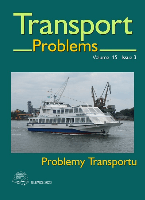
Transport Problems
Scope & Guideline
Driving Knowledge Forward in Automotive and Mechanical Engineering
Introduction
Aims and Scopes
- Safety in Transportation:
Research focused on improving safety measures in transportation systems, including studies on driver behavior, accident analysis, and safety technology implementation. - Sustainable Transport Solutions:
Exploration of environmentally friendly practices and technologies in transportation, including electric vehicles, renewable energy applications, and sustainable urban mobility. - Transport Infrastructure Development:
Analysis of the planning, construction, and maintenance of transportation infrastructure, including roads, railways, and urban transport systems. - Transport Economics and Policy:
Investigations into the economic impacts of transportation systems, including cost-benefit analyses, policy evaluations, and the influence of transportation on economic growth. - Innovative Transportation Technologies:
Research on the development and application of new technologies in transport, such as autonomous vehicles, smart traffic management systems, and advanced logistics solutions. - Intermodal and Multimodal Transport:
Studies focusing on the integration of different transport modes, optimizing routes, and enhancing the efficiency of cargo and passenger transit.
Trending and Emerging
- Autonomous and Connected Vehicles:
A significant increase in research related to autonomous vehicle technologies and their integration into existing transport systems, reflecting the industry's shift towards automation and connectivity. - Impact of COVID-19 on Transportation Systems:
Emerging studies examining the lasting effects of the COVID-19 pandemic on transportation behavior, infrastructure use, and public transit systems, highlighting a need for adaptive strategies. - Smart Mobility and Urban Transport Solutions:
Growing focus on smart mobility solutions, including shared transport services, smart traffic management, and urban planning that prioritizes sustainable and efficient public transport. - Environmental Impact Assessments:
Increased emphasis on evaluating and mitigating the environmental impacts of transportation systems, including studies on emissions, energy consumption, and sustainability practices. - Data-Driven Transportation Research:
An upward trend in utilizing big data and advanced analytics to inform transportation research, including traffic modeling, predictive maintenance, and optimization of transport routes.
Declining or Waning
- Traditional Freight Transport Methods:
Research on conventional freight transport methods, such as rail and road freight, has decreased, possibly due to the growing emphasis on multimodal and innovative transport solutions. - Basic Traffic Management Strategies:
Studies concentrating on basic traffic management strategies without the integration of advanced technologies or data analytics have waned, as researchers seek more dynamic and technologically advanced approaches. - Passenger Behavior Studies in Stable Conditions:
Research focusing on static analyses of passenger behavior in transport systems has diminished, as there is a shift towards understanding behavior under changing conditions, such as during crises or technological disruptions.
Similar Journals
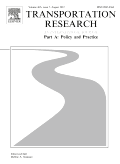
TRANSPORTATION RESEARCH PART A-POLICY AND PRACTICE
Advancing transportation policy through rigorous research.TRANSPORTATION RESEARCH PART A-POLICY AND PRACTICE, published by PERGAMON-ELSEVIER SCIENCE LTD, stands as a premier journal in the domain of transportation research. With a robust impact factor and a distinguished reputation, this journal is ranked in the first quartile (Q1) across multiple fields, including Aerospace Engineering, Business, Management and Accounting, Civil and Structural Engineering, Management Science and Operations Research, and Transportation. The journal's comprehensive scope invites contributions that influence policy-making and practice in transportation systems, ensuring relevance in both scholarly and practical contexts. Additionally, the journal's convergence years span from 1992 to 2024, marking a significant history of impactful research. Published in the United Kingdom, it provides a vital platform for researchers, professionals, and students seeking to advance their understanding of transportation issues globally. As an essential resource in the field, this journal facilitates the dissemination of innovative ideas and solutions that shape the future of transportation.
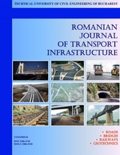
Romanian Journal of Transport Infrastructure
Pioneering Research in Transport Engineering and ManagementWelcome to the Romanian Journal of Transport Infrastructure, a premier publication dedicated to advancing knowledge in the field of transport infrastructure engineering and management. Published by SCIENDO, this open access journal has been committed to sharing significant research and developments since 2012, ensuring that vital information is readily available to the global academic community. The journal's ISSN is 2286-2218, and it provides a platform for researchers, professionals, and students to collaborate and disseminate findings related to transport systems planning, design, construction, and maintenance. The Romanian Journal of Transport Infrastructure aims not only to contribute to scholarly literature but also to influence policy and practice related to transportation challenges. Our editorial team strives to maintain high standards of academic rigor and relevance, making this journal an essential resource for anyone involved in the transport infrastructure sector.

PROCEEDINGS OF THE INSTITUTION OF CIVIL ENGINEERS-TRANSPORT
Pioneering Research for Tomorrow's Transportation SolutionsPROCEEDINGS OF THE INSTITUTION OF CIVIL ENGINEERS-TRANSPORT, published by Emerald Group Publishing Ltd, is a vital scholarly journal dedicated to advancing knowledge in the fields of civil and structural engineering and transportation. With an ISSN of 0965-092X and an E-ISSN of 1751-7710, this journal has been a cornerstone of academic discourse since its inception in 1992, providing a platform for innovative research and case studies up until 2024. Although it currently holds a Q4 quartile ranking in both Civil and Structural Engineering and Transportation categories, its content aims to bridge gaps in existing literature, making it a relevant source for researchers, professionals, and students alike. The journal offers an array of insightful articles that contribute to the evolution of engineering practices and transportation methodologies, fostering a global dialogue among industry stakeholders. While it operates under a subscription model, the journal remains committed to enhancing public access to pivotal findings in engineering disciplines, driving forward the agenda of sustainable and efficient infrastructure development.
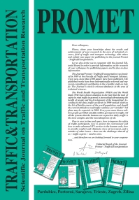
Promet-Traffic & Transportation
Innovating Solutions for Modern Mobility ChallengesPromet-Traffic & Transportation is a premier open-access journal published by SVEUCILISTE U ZAGREBU, FAKULTET PROMETNIH ZNANOSTI, dedicated to advancing the fields of traffic and transportation engineering. Since its inception in 2001, the journal has played a crucial role in disseminating innovative research and best practices within its scope, which embraces civil and structural engineering, urban studies, and various engineering disciplines. With a Q3 ranking in multiple categories as of 2023, including Civil and Structural Engineering and Ocean Engineering, Promet is positioned to provide valuable insights into contemporary challenges and solutions in transportation systems. Open-access since 2013, the journal ensures that all published articles are freely available to researchers, practitioners, and students globally, fostering a collaborative environment for knowledge exchange. Based in Croatia, it serves as an essential platform for interdisciplinary studies that influence the future of traffic and transportation policies and practices.

Transport and Telecommunication Journal
Transforming Transport Through Open Access InsightsTransport and Telecommunication Journal is a premier open-access publication dedicated to advancing the fields of transport and telecommunications. Published by SCIENDO, this journal has been providing a platform for innovative research and discussions since 2008, catering to a global audience. With a current impact factor that reflects its growing influence in the academic community—ranking in the Q3 quartile for both Computer Science Applications and Engineering (Miscellaneous)—its articles cover a wide range of topics pertinent to contemporary transport challenges and the integration of telecommunications technology. Notably, the journal's reach extends internationally from Latvia, promoting accessibility and collaboration across borders, as it has been fully open access since 2012. Researchers and professionals are encouraged to contribute to this dynamic forum, where cutting-edge studies and insights into engineering and computer science disciplines converge.
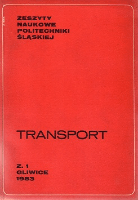
Scientific Journal of Silesian University of Technology-Series Transport
Empowering knowledge sharing in the realm of transport.Scientific Journal of Silesian University of Technology-Series Transport is an esteemed academic platform dedicated to the field of transport engineering, published by FAC TRANSPORT SILESIAN UNIV TECHNOLOGY. Established as an Open Access journal since 2008, it ensures wide dissemination and accessibility of research findings to foster knowledge sharing within the global community. With an ISSN of 0209-3324 and an E-ISSN of 2450-1549, this journal plays a critical role in advancing interdisciplinary discussions in applied Aerospace, Automotive, Civil and Structural, and Mechanical Engineering. Currently classified in Q4 across various engineering subfields according to 2023 metrics, it provides a platform for emerging research and insights into transport systems. Despite its recent establishment, the journal demonstrates growing visibility, contributing to a range of social science discussions in transportation with a Scopus percentile ranking of 18th. Researchers, professionals, and students will find valuable knowledge and innovative approaches in its pages, as it bridges theoretical and practical aspects of transport engineering.

Case Studies on Transport Policy
Transforming urban landscapes with impactful transport policies.Case Studies on Transport Policy, published by Elsevier, is an influential journal in the fields of transport policy, urban studies, and geographic planning. With its ISSN 2213-624X and E-ISSN 2213-6258, this quarterly journal has consistently maintained a strong impact within its scope, attaining Q1 rankings in Geography, Planning and Development and Urban Studies, as well as a Q2 ranking in Transportation for 2023. The journal provides a platform for high-quality research and practical case studies that contribute significantly to the understanding and improvement of transport systems and policies worldwide. Its rigorous peer-review process ensures that published articles are of the highest academic standard, appealing to researchers, policy-makers, and professionals alike. With a strong presence in several social sciences categories, the journal ranks highly in Scopus, positioning itself as a critical resource for those engaged in the strategic development and analysis of transport solutions. Located in Amsterdam, Netherlands, it aims to bridge the gap between research and real-world applications, facilitating knowledge exchange and innovative strategies in transport policy.
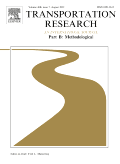
TRANSPORTATION RESEARCH PART B-METHODOLOGICAL
Advancing the frontier of transportation research methodologies.TRANSPORTATION RESEARCH PART B - METHODOLOGICAL is a premier academic journal published by Pergamon-Elsevier Science Ltd, focusing on innovative methodologies and solutions in the field of transportation research. With a prestigious Q1 ranking in key categories, including Civil and Structural Engineering, Management Science and Operations Research, and Transportation, the journal demonstrates its vital role in advancing the academic discourse and practical applications within these domains. Boasting an impressive Scopus ranking of #20 in Civil and Structural Engineering and #15 in Transportation, it attracts high-quality research that informs policy, enhances transport systems, and contributes to sustainable development. The journal serves as a critical platform for researchers, practitioners, and students alike to disseminate findings that push the boundaries of transportation science. With a publication history dating from 1979 to 2024, TRANSPORTATION RESEARCH PART B is dedicated to fostering interdisciplinary collaborations and inspiring new methodologies to tackle complex transportation challenges. As a vital resource for the academic community, it leverages a broad international perspective to enrich the field and facilitate cutting-edge research.

European Journal of Transport and Infrastructure Research
Advancing transport knowledge for a sustainable future.The European Journal of Transport and Infrastructure Research (EJTIR) is a premier academic journal dedicated to advancing the field of transport and infrastructure studies. Established in 2000 and published by the EDITORIAL BOARD EJTIR in the Netherlands, this open-access journal promotes the dissemination of high-quality research through a global platform. With an impressive categorization in the Q2 quartile for Geography, Planning, and Development, as well as Urban Studies, and a Q3 ranking in Transportation as of 2023, EJTIR is recognized for its significant contributions to these vital disciplines. It holds commendable Scopus rankings, reflecting its impact and relevance in the social sciences. The journal's objectives include fostering innovative research, facilitating a dialogue among scholars, practitioners, and policymakers, and addressing contemporary transportation challenges. The open access model ensures that research findings are accessible to a wider audience, thereby promoting evidence-based decision-making in transport policies and infrastructure development. Researchers, professionals, and students are encouraged to engage with the journal's content, contributing to the ongoing discourse in this essential field.
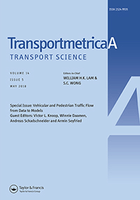
Transportmetrica A-Transport Science
Pioneering Insights for Tomorrow's Transport SystemsTransportmetrica A-Transport Science, published by Taylor & Francis Ltd, is an influential journal at the forefront of transport science research. With an ISSN of 2324-9935 and an E-ISSN of 2324-9943, the journal spans a diverse range of topics within the field of transportation and engineering. Since its inception in 2013, it has aimed to provide a platform for high-quality, innovative research, reflecting significant advancements and challenges in transportation systems. Recognized for its academic rigor, it has achieved a Q1 ranking in Engineering (miscellaneous) and a Q2 ranking in Transportation for 2023, reflecting its impact and relevance in these fields. With impressive Scopus rankings of #31/307 in General Engineering and #31/141 in Transportation, the journal is positioned in the top 90th and 78th percentiles respectively. Though not an open-access publication, Transportmetrica A promotes accessibility of knowledge and strives to foster discourse among researchers, professionals, and students alike, making it an essential resource for anyone invested in the future of transportation science.